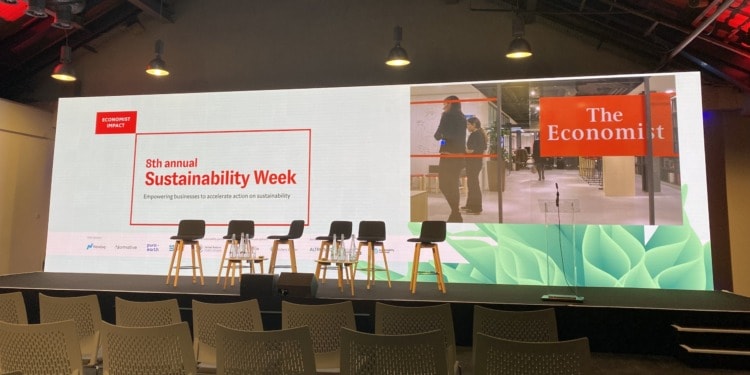When it comes to taking responsibility for tackling climate change, no one is exempt. Both a commitment to change and a proactive approach to sustainability are required at the individual, institutional, industrial and international levels. This past week, by hosting their 8th annual Sustainability Week in London — which Impakter attended — The Economist provided a platform for businesses in particular to discuss how they can catalyze the sustainable transition.
As UN Secretary-General, António Guterres, said in his opening keynote address at the summit, in tackling the climate crisis: “The private sector is pivotal.”
Core mission of the summit
Sustainability Week 2023 was organised by the Economist Impact division of the Economist Group, which invited over 300 expert speakers to discuss topics centered around the planet and sustainability.
Economist Impact also have their own in-house “Sustainability Project” and “change equation” to drive and create change:
“[Insight + innovation + influence] = Impact.”
Eight core topics were featured at the summit, spanning from “Green finance and investment,” “Policy regulation and reporting,” “Circularity and supply chain” and “Decarbonising business models” to “Biodiversity,” “Innovative technology,” “Social sustainability” and “Resilience and adaptation.”
What was the goal? To empower “businesses to accelerate action on sustainability.”
Common threads at the summit
The summit’s agenda featured a multitude of discussions in the form of interviews, panels, fireside chats, presentations, debates and more. Of the sessions Impakter was able to participate in, discussions were interwoven with some common threads of crucial sustainability themes which perhaps reflect prominent global climate talking points at present.
Here is a quick rundown of some of the recurring talking points at the talks were attended.
Moral leadership
Though the main focus of the summit was on businesses, there were many questions focused on where the responsibility for climate action, driving sustainability and policing greenwashing truly falls; is it the public, private sector or government?
The resounding conclusion from many discussions appeared to be that such responsibility is collective, falling on all members of society, individually and institutionally, and that everyone must come together under moral leadership.
One question which arose was whether the climate crisis is one of insufficient technology, finance, regulatory framework or in fact resulting from inadequate moral climate leadership.
In a discussion on how industries aren’t moving fast enough on climate action, Paul Polman, former CEO of Unilever, member of the UN panel which outlined the 2030 Sustainable Development Goals and co-author of “Net Positive: how courageous companies thrive by giving more than they take,” warned that “being ‘less bad’ isn’t good enough anymore,” echoing his own statement in an interview with Board Intelligence, last October.
The government’s role in informing the public was often reiterated in talks at the summit, as was the responsibility of businesses to operate under a “moral code” and set science-based targets.
In a discussion on marrying sustainability with profitability at the summit, Maria Mendiluce, CEO of the We Mean Business Coalition, said that companies that have set science-based targets are in fact “outperforming in their markets.”
Sustainable transition skills gap
There was also an emphasis on a “skills gap” in many different contexts, notably in relation to the clean energy transition.
Several speakers touched on how existing skill sets will need to be transformed to facilitate the scale-up and installment of clean energy infrastructure, explaining how people will need to be trained with a new base of “green skills” for the future.
For example, in a talk on the global hydrogen economy, panelists discussed the possibility of retraining fossil fuel workers for the hydrogen transition.
And in a talk titled “Accelerating business ambition to achieve the SDGs,” Sue Allchurch, Chief of Outreach and Engagement at the UN Global Compact, referred to the UN Sustainable Development Goals (SDGs) as “the world’s KPIs.”
Emerging markets
How emerging markets are being considered in the climate and biodiversity conversations featured prominently throughout talks Impakter attended, both as key agenda talking points and as questions raised by the audience.
For example, in a panel on investment in emerging markets on the path to net zero, panelists spoke about how, as billions of people from developing countries are now joining the economy, we cannot afford to only focus on developed countries in climate conversations.
Similarly, in his keynote speech, Graham Stuart, UK Minister of State for Energy Security and Net Zero, spoke about the UK government’s climate finance strategy for supporting developing carbon markets and protecting the most vulnerable developing countries on the “frontline.”
Mindset and culture shift
As well as moral leadership, questions were raised at the summit around whether the challenge of reaching climate goals is one of perspective, rather than technology, finances or regulatory framework.
As such, many speakers at the summit underlined how a transition in mindset and culture must accompany the green transition, as well as the climate narrative needing to be reframed and the language and jargon used to discuss the crisis reformed.
For example, in the hydrogen economy session, experts discussed how the industry should move away from the colour system used to define types of hydrogen (green, blue, grey and pink) and instead focus more on what matters: its carbon intensity.
Related Articles: Greening Europe’s Corporate Fleets: Progress, Hidden Costs and Considerations | Navigating the EU Corporate Sustainability Reporting Directive [2023] | The ChatGPT ‘Cookbook’: Simple Recipes for Personal and Business Success | Why Do So Many Companies Lack Women Leaders?
Other speakers stressed that, though jargon such as “adaptation,” “mitigation” and “nature positive” are of course vital, the bottom line is that we need to analyse the risks holistically and set clear targets to avoid misinterpretation of language.
Panelists from some of the biggest climate-friendly food brands highlighted how overuse of the climate narrative has potentially led to consumers becoming numb to it, suggesting that brands could instead try to focus on the quality of sustainable products to sway buying preferences.
Nate Gorence, Chief of Staff & Head of Business Development at Impossible Foods, home of plant-based meat such as the “Impossible Burger,” said the aim is for meat-eaters to wake up and think: “I’m craving an animal-free burger.”
The green revolution
Green finance and the importance of investing in the future were centric to many talks at the summit. But equally, many speakers presented the idea that as well as significant risk, the climate crisis could actually present a business opportunity and possibly reframes businesses’ position in fighting climate change from one of forfeit to one of success instead.
In his keynote speech, Minister Stuart said “the biggest cost is not of net zero, but is the cost of missing out.”
The power of the consumer, the need to follow consumer trends and the opportunity to create a market for planet-focused services and commodities, were also highlighted in talks as crucial strategies for driving change.
As was “futureproofing” of businesses, with many executives discussing how climate change, environmental degradation and biodiversity loss should now be considered as tangible business risks in corporate risk assessments.
In a session focused on financing a sustainable future, Steve Howard, Chief Sustainability Officer (CSO) at Temasek, wisely stated: “There are no returns on a dead planet,” echoing his previous statement during an interview with McKinsey and Company.
Collaboration vs. competition
The optimal dynamic between businesses in tackling the climate crisis was analysed in several talks at the summit, with questions around whether corporate climate strategies should be underpinned by competition or collaboration.
Some speakers suggested an collaboration and joint initiatives between sectors and society was the best method, others stressed the importance of maintaining competition within the markets to drive innovation.
In a panel discussion on competition and collaboration on the path to net zero, Michael Grenfell, Executive Director of Enforcement at the UK’s Competition and Markets Authority (CMA), stressed that although collaboration is important, competition is also helpful to drive green innovation, echoing his recent guest blog post for Economist Impact.
In speaking about tackling greenwashing at the summit, he also highlighted the importance of preventing environmentalism from being used as a “fig leaf to form a cartel.”
Leveling the playing field
Harmful subsidies were mentioned in many talks at the summit, mostly in the context of “leveling the playing field” for sustainability-focused companies to compete with the existing traditional industries such as the fossil fuel, dairy and meat sectors.
A widespread shift in policy framework and legislation to drive this was called for by many speakers.
“Give recognition to the people who are doing the right thing,” said Andrea Meza Murillo, Deputy Executive Secretary of the United Nations Convention to Combat Desertification (UNCCD), in a session on sustainable food systems.
There’s no silver bullet
A need to accelerate climate action rather than wait for a perfect solution was also emphasised by many speakers at the summit.
In a panel discussion on climate technology, Sean O’Sullivan, Managing General Partner and Founder of the global venture capital firm, SOSV, which invests in “deep tech for human and planetary health,” spoke of the need to fund technology “around the corner.”
Diversity was also underlined as crucial, in many contexts – food, energy, technology, innovation, strategy, inclusion, representation and perspectives alike – largely due to the lack of a cure-all or silver bullet to solve the crisis.
In a talk focused on adaptation vs. mitigation, Steve Kenzie, Executive Director at the UN Global Compact Network UK, highlighted the need to prioritise both strategies in addressing the crisis, stating that “climate adaptation cannot be the ‘poor cousin’ of climate mitigation.”
And Andrea Meza Murillo of the UNCCD highlighted the need to focus on gender equality in building sustainable food systems, as “half of farmers are women but very few can own land.”
📢 The UN @globalcompact strongly supports the call made by UN SG @antonioguterres at #EconSustainability Week, urging the private sector to take immediate action to limit global warming to 1.5°C.
👉 Read here: https://t.co/qGPwReCYo7
👉 Take action: https://t.co/K6BhkFtyLN pic.twitter.com/wKWxgcxn9u— UN Global Compact (@globalcompact) March 29, 2023
“The private sector is pivotal”
UN Chief Guterres’ opening keynote speech suitably set the scene for sustainability discussions at the summit, but it also served as an urgent call to action for the many global corporate and thought leaders in attendance:
“Sustainability Week comes on the heels of a landmark synthesis report by the Intergovernmental Panel on Climate Change. It confirmed that global emissions are at their highest level in human history and rising. Climate chaos is wreaking havoc on economies, businesses, supply chains and public finances. And we are on a trajectory for far worse.”
He went on to mention how the report reveals we still have “a narrow window” in order “to avert catastrophe” and that “we need a quantum leap forward.”
“Governments must lead,” said Guterres, further into his speech, but “the private sector is pivotal” and “business models must be transformed” to drive “the full phase-out of fossil fuels” and scale-up of “investments in renewable energy.”
“Don’t allow yourselves to be collateral damage,” he warned the many onlooking business executives, government officials, policymakers, financiers, investors and NGO representatives.
“Now more than ever, people expect corporate leaders to speak up, act and end greenwashing.”
Let’s hope this message has been heard, and the many crucial people- and planet-focused conversations held at Economist Impact’s Sustainability Week translate into tangible, catalytic action.
— —
Correction: This article has been updated since original publication to: include a quote from the UN Chief’s opening speech at the summit in the title, to clarify that Steve Howard’s quote from Sustainability Week 2023 was originally stated in an interview with McKinsey and Company, Paul Polman’s quote from Sustainability Week 2023 was originally stated in an interview with Board Intelligence, and Michael Grenfell recently wrote a guest blog on competition for Economist Impact in addition to speaking at Sustainability Week 2023.
Editor’s Note: The opinions expressed here by the authors are their own, not those of Impakter.com — In the Featured Photo: Main stage at The Economist Sustainability Week 2023. Featured Photo Credit: Lauren Richards







